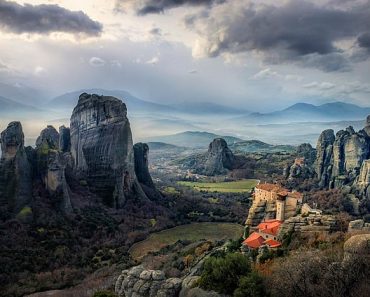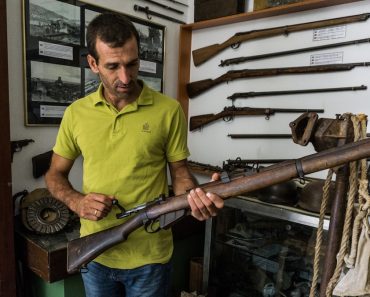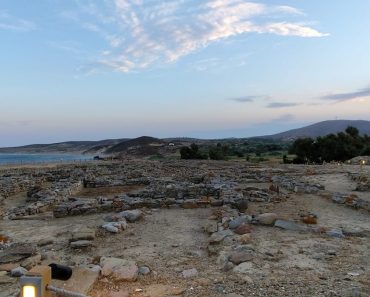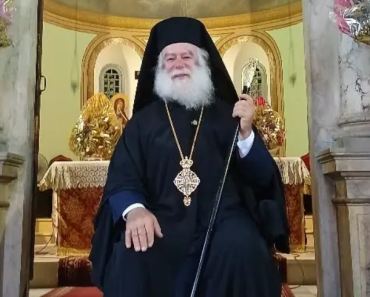The mountains look on Marathon—
And Marathon looks on the sea;
And musing there an hour alone,
I dreamed that Greece might still be free;
For standing on the Persians’ grave,
I could not deem myself a slave.
The renowned British poet and ardent philhellene, Lord Byron, composed these lines in his poem “The Isles of Greece.” His words blended admiration for the past with hope for the future. He was so dedicated to the Greek cause he died of fever in Greece in 1824 while volunteering to fight in the Greek War of Independence. Hundreds of Europeans, many of them rich and well-educated, backed the Greeks during the war against the Ottoman Empire. What were their motivations, and what is the meaning of being a “Philhellene”?
Philhellenes are those who admire Greek culture, history, and people. It originates from the Greek words “philos,” meaning friend or lover, and “Hellen,” meaning Greek. While it began as an intellectual movement, the rise of Greek nationalism in the 19th century gave it a political dimension. During the Enlightenment, there was a rise in a European fascination with ancient Greece, viewing its political principles, artwork, and philosophy as the basis of Western civilization.
Their admiration quickly turned towards scientific pursuits, which prompted them to concentrate on classical studies, specifically ancient texts and archaeological discoveries. They viewed ancient Greek literature and art as the highest aesthetic standard. Inspired by ancient Greece, intellectual figures such as Johann Winckelmann (founder of modern archaeology) and Goethe infused their creations with classical Greek elements.
Romantic ideals increasingly highlighted the connection between ancient Greece and modern Greece in the development of Europe. This idealized view was also because of a lack of understanding of modern Greece. Although wealthy individuals were captivated by ancient history and undertook Grand Tours of classical Italian sites, the difficulty of traveling to Ottoman Greece led to imaginative, idealized artistic representations connecting ancient and modern Greeks.
For instance, when a philhellene compared Nikotsaras, a Greek warrior, to the mythical hero Achilles, Nikotsaras became enraged and nearly assaulted the philhellene, mistakenly believing Achilles to be another bandleader. Historian William St. Clair calls it a paradox: these ideas, though originating in Greece, are European in nature and were later reintroduced to Greece by Europeans.
Unexpectedly, the Greek revolution erupted first in Wallachia (present-day Romania) in 1821, then engulfed the Morea (southern Greece) before sweeping across the Ottoman Balkans and even reaching Anatolia, taking the Ottoman Empire by surprise because of its scale and organization. The scale of the rebellion prompted an immediate and powerful response from the Ottoman Empire, which had never encountered such a national uprising. The empire’s harsh response was also influenced by the international climate. The 1815 Congress of Vienna vowed to suppress liberal, republican, and nationalist movements. In this context, although not officially part of Congress, the Ottomans believed Greece would receive no European support.
However, the public belief in Europe persisted that modern Greeks, as heirs to ancient Greece and its contribution to Western civilization, needed support. Greek political pronouncements of this era also drew on ancient figures and events, such as Thermopylae, Leonidas, and the struggle against the Persians. Even though the events unfolded in 1821, European newspapers and booklets discussing them incorporated these ancient themes into their coverage.
When news of the Greek Revolution spread throughout Europe, many volunteers set out to join the fight. The first Philhellenes to join the war included several highly experienced Napoleonic officers. For instance, the renowned French philhellene, Baleste, is still recognized as the initial commander and trainer of the Greek military. He perished in 1822 during a battle.
Contrary to the expectations of many philhellenes who anticipated immediate action and heroic recognition, their contributions, while sometimes boosting morale, did not always materialize as such. Upon arrival, many philhellenes rapidly lost their fortunes and were reduced to begging for food and money to return home or join the Greek central government. The local population, already starving and exploited by local gangs, offered little help. Disillusioned and wishing to return home, these volunteers found the Great Powers, officially opposed to liberal movements, unwilling to grant them passage; sometimes, the volunteers were even considered rebels. Their illnesses also resulted in extended periods of quarantine.
At Greek ports, newly arrived philhellenes consistently saw departing philhellenes. Despite firsthand accounts from those who had lived through it, newcomers dismissed the realities of the uprising, labeling contrary opinions as fabrications or the product of personal incompetencies. As St. Clair observed, ‘… an idea that had captivated Europe for centuries could not be so easily turned back by plain accounts of direct experience. The magic of the philhellenic dream continued to claim the youth of Europe. Somehow they managed to convince themselves that for them it would be different, and the ships, laden with volunteers, continued to leave Marseilles on their way to Greece.’
During this time, European philhellene groups channeled support to the Greek revolution, while other volunteers arrived independently. Germany, and Bavaria in particular, were strongholds of Philhellenism, a fact not unexpected, considering a Bavarian prince later became the first king of independent Greece. German and Swiss newspapers also urged readers to provide financial and military aid.
In late 1822, these German philhellene groups organized an expedition. Unlike the first volunteer force, these fighters would be officially contracted, fully equipped, under military command, and theoretically well-supplied by the Greek government. However, the problems started from the beginning. Although the German Legion reached Greece, they were not permitted to land for two weeks. Permission was only granted when they threatened to blow up the ship.
It quickly became apparent to the Germans that they were actually unwanted. Greek forces had recently won a battle against the Turks, so further support was not needed. They were unwilling to share the victory, and even more so, their limited resources. The German Legion remained idle, with no assignments for an extended period. Meanwhile, disease swept through their camps, causing the deaths of many German volunteers; some desperately walked home, while others aimlessly wandered the cities.
The main issue for volunteer efforts was the lack of central authority and coordination. Local guerrilla leaders were the revolution’s driving force, but they were battling not only the Ottomans but also one another. Internal strife during the Greek War of Independence (1821-1829) was so severe that it resulted in two civil wars (1823-1824 and 1824-1825). This posed a serious problem for philhellenes. Their expectation of joining a disciplined army upon landing was shattered by an unexpected recruitment attempt from individuals with the appearance of brigands and highwaymen. Joining such bands was unacceptable to these wealthy, highly educated young European philhellenes. Their fight was for Greece, not for the local bandits who resembled Ottomans more than ancient Spartans, with their attire and pipe-smoking.
Following the German Legion, Lord Byron’s involvement in Greece triggered a second wave of volunteers. To fund the Greek Revolution, Lord Byron sold his English mansion and donated his wealth to the cause. He financed a Byron Brigade composed of philhellenes that served under him. After past failures, Byron’s presence and funding revitalized the philhellenist volunteer movement. However, the brigade did not last long after his unexpected death. The Byron Brigade suffered greatly, with many succumbing to illness, committing suicide, or falling into poverty, a fate similar to the German Legion. However, philhellenes kept coming, now mainly from the USA and France.
Although united in their support for Greece, the philhellenes were a divided group, fractured along national lines; for example, the French clashed with the Germans, and the Italians with the French. Furthermore, philhellenes often engaged in honor duels. Some men were so severely injured they were sent home without ever encountering an Ottoman soldier.
With a death rate as high as one in three, the mortality among philhellenes was shocking, particularly since they were in the country for such short periods, ranging from a few weeks to a few months. Unsurprisingly, some Philhellenes defected to the Ottoman forces, a common practice as the Ottomans frequently hired Europeans to modernize their army; for instance, they once employed a captured German philhellene doctor. Later, these same philhellenes would revisit Greece, but now fighting to bring it under Ottoman rule.
Philhellenic societies provided not just volunteers but also material and financial aid. The London Philhellenic Committee provided loans worth millions of pounds during the revolution, for instance. This was crucial because Greece desperately needed money. Widespread food shortages resulted from the country’s ruined state and the near-total collapse of farming. Meanwhile, to finance these loans, many philhellenic pamphlets falsely inflated Greece’s post-war wealth, claiming its agriculture would easily repay all debts.
The London Philhellenist Committee also provided Greek revolutionaries with weapons and mountain artillery; meanwhile, the committees in the US and Britain even built warships for them. In addition to military aid, over a hundred books were published by philhellenes only in France during the Greek War of Independence to influence public opinion.
The events of the war also had a significant effect on public opinion. Widespread newspaper coverage and artistic depictions, such as Delacroix’s famous painting, made the Chios Massacre a turning point in European public opinion. Victor Hugo also penned a poem, “L’Enfant,” about the massacre. In 1822, Greek groups travelled to the island of Chios, which was a prosperous island near the Turkish mainland. This provoked a severe reaction from the Ottoman Empire. The Ottoman army’s operation swelled with thousands of Turks who came by small boat from the mainland to join the pillage, resulting in a chaotic and uncontrollable situation. Tens of thousands of people perished or were enslaved.
The fall of Missolonghi, a major centre of Greek resistance, to the Ottomans in 1826 marked another significant event. Their attempt to break the siege and escape with soldiers and civilians, including women and children, failed. Thousands were killed and captured when the Ottomans crushed the already weakened defences. A significant number of the Philhellenes in Missolonghi met the same fate. The city’s fall further damaged European public opinion and fuelled the philhellenist movement. Previously unknown, the city became renowned, with its name tied to the heroic Spartans and Athenians.
Interestingly, European public opinion favoured Greece, despite both sides committing atrocities. However, some philhellene volunteers, witnessing the war firsthand, revised their opinions. The Siege of Tripolitsa represented a turning point, most notably because of the large-scale massacre of Turks that occurred there.
The city of Tripolitsa surrendered after a long siege, when hunger finally became unbearable. At least 8,000, possibly as many as 40,000 Turks and Jews sheltering in the castle, perished. European philhellenes at the scene also recorded the incidents, where some Turks had their limbs cut off for hiding their money, and pregnant Turkish women were mutilated with dog heads placed between their legs. The sheer scale of the massacre led to a plague in Greece because of uncollected bodies, a situation that persisted until the war’s end.
Children who hid during the first massacre were hunted down by Greek rebels when hunger drove them to search for food. Many volunteers returned to their homes after what happened in Tripolitsa. Some, including a German doctor, committed suicide by poisoning themselves after witnessing the massacre. Others attempted to save survivors by purchasing them as slaves.
George Finlay, a historian who wrote a history of Greek Revolution, and also fought in the battle as a philhellene, cites Gordon, another philhellene: “Whatever national or individual wrong the Greeks may have endured, it is impossible to justify the ferocity of their vengeance, or to deny that a comparison instituted between them and the Ottoman generals (…) would give to the latter the palm of humanity. Humanity, however, is a word quite out of place when applied either to them or to their opponents.”
On the other hand, European public opinion showed little concern for atrocities against Turks, revealing a bias towards the Greeks and viewing their actions as legitimate retribution against the “barbaric” Ottoman Turks. Likewise, when British Foreign Secretary Lord Castlereagh informed British Parliament that both sides had committed atrocities, he was accused of being “pro-Turk.”
Despite the philhellenes’ minimal battlefield contribution, Greece’s independence was somehow still depended on the backing of Europe. However, there were difficulties. The Congress of Vienna’s 1815 decisions meant European powers would not, in principle, support the Greeks. Indeed, there was a lack of official support at the beginning. Despite this, pro-Greek sentiment among the public and elite classes started to evolve and influenced official positions.
The Ottomans’ inability to suppress the uprising also led to European powers seeking influence in a potentially independent Greek state. International sympathy for Greece grew in response to the Ottomans’ harsh responses as well. For instance, the Patriarch of Constantinople, head of the empire’s Orthodox Christians and a Greek himself, was executed for his alleged support of the rebellion. This was seen as a major provocation, leading even non-rebellious Greeks to join the rebels, and prompting Russia to cut diplomatic ties.
By 1825, internal conflict had weakened the Greek uprising, allowing the Ottomans, aided by the modernised army of their Egyptian governor, Muhammad Ali of Kavala, to regain lost territory. Facing imminent collapse, the Greek Revolution was saved when European powers and public pressure combined to support the creation of an autonomous Greece. However, the Ottomans rejected this settlement.
In 1827, France, Britain and Russia finally convened to forcefully establish peace. Their navies sailed to Greece to seize control of Ottoman naval operations. Escalating tensions led to the Battle of Navarino, resulting in the near-destruction of the Ottoman navy within hours. The public in Europe celebrated this operation enthusiastically. Following the Battle of Navarino, the Russo-Turkish War of 1828-29 began, quickly turning into a catastrophic defeat for the Ottoman Empire. The Treaty of Adrianople, which concluded the war, granted Greece autonomy.
Shortly thereafter, however, major world powers signed a new protocol that altered the decisions for an independent Greece. The Ottomans, though unhappy, could not fight back because of the complete absence of a military, both on land and sea. France, Britain, and Russia formally recognised Greece’s independence in 1830 and secured its sovereignty under their protection.
Philhellenes sought not only to liberate Greece but also to satisfy their personal idealizations and dreams, which sometimes overshadowed the initial cause. Their involvement in the Greek War of Independence was driven by idealism, romanticism, and personal fulfilment rather than a clear, unified goal of liberation. In the end, the harsh realities of war clashed with their dreams of glory; their sacrifices had minimal impact. However, this support shaped European public opinion, resulting in crucial international backing for the eventual independence of Greece.







